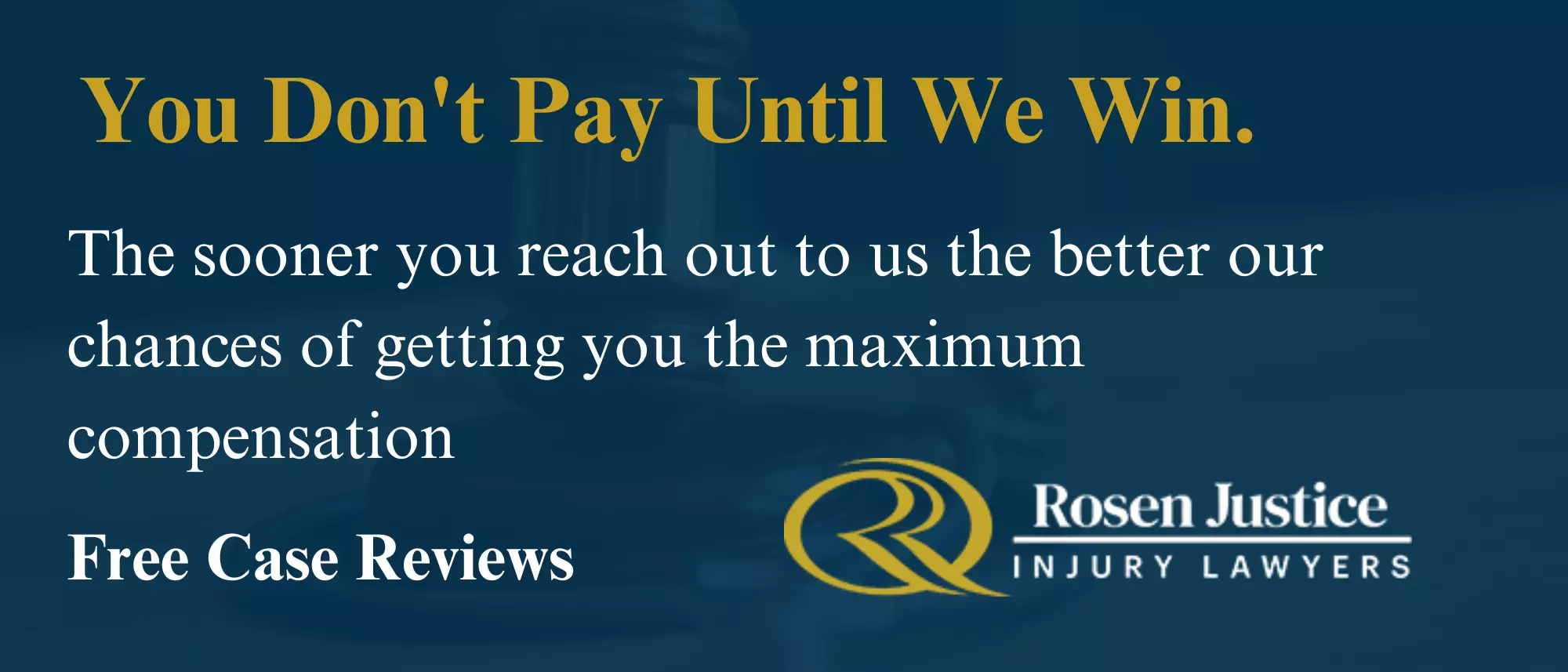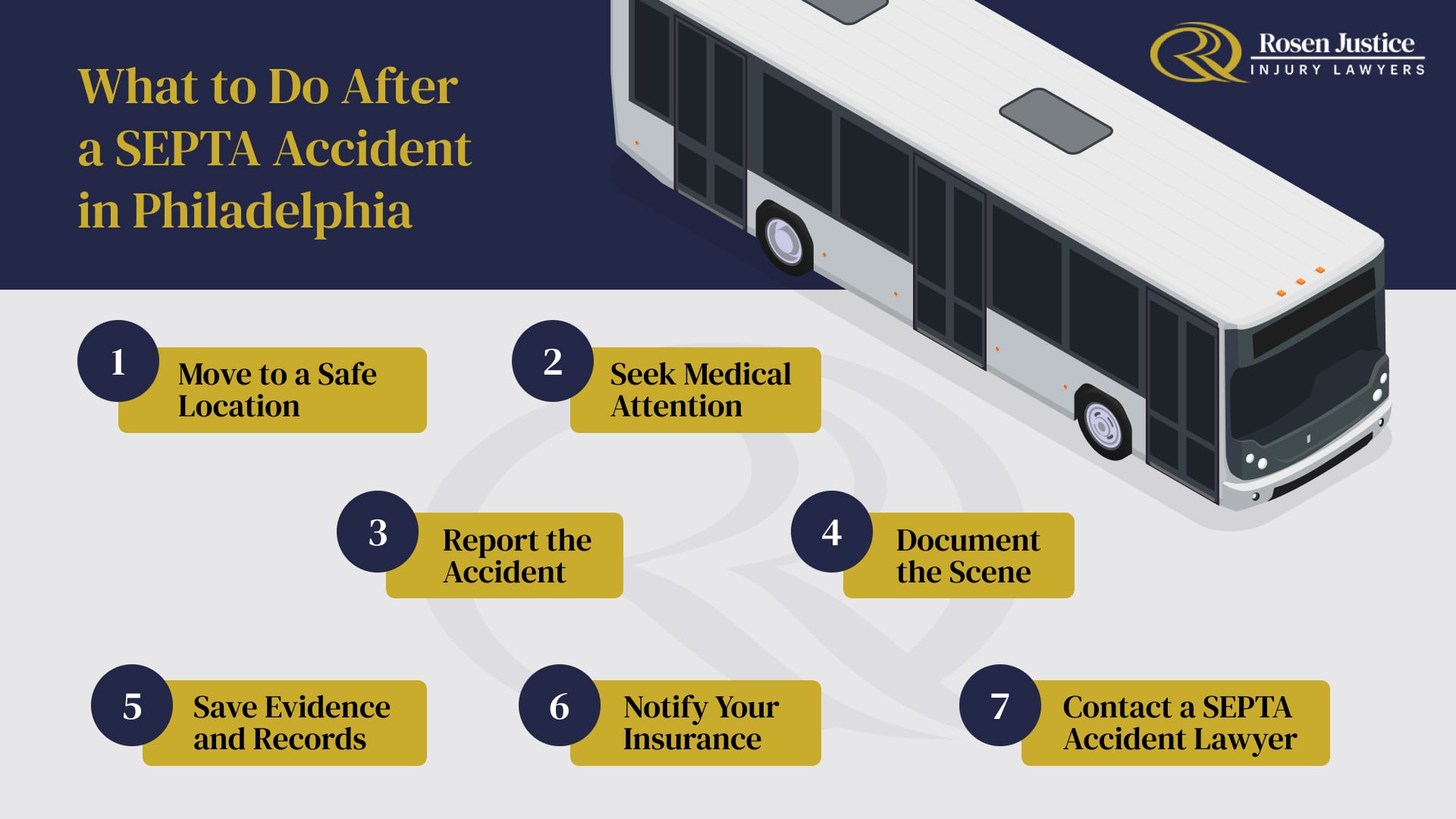Philadelphia SEPTA Accident Lawyer
Do you need a Philadelphia SEPTA accident lawyer? If you’ve been injured in a SEPTA accident, you may receive financial compensation.
The Rosen Justice Injury Lawyers represent victims of SEPTA accidents including SEPTA-related injuries.
Our Philadelphia SEPTA accident lawyers provide aggressive, relentless representation for victims as they claim financial compensation.
Your SEPTA Accident Lawyer in Philadelphia
When you’re looking for a Philadelphia SEPTA accident attorney to help you after an injury, get in touch with our team of professionals for your consultation.
We have the skills, resources, and drive to get results for our clients. The Southeastern Pennsylvania Transportation Authority (SEPTA) operates a network of buses, trolleys, commuter trains, subways, and electric trolleys throughout the region.
If you were injured in any of the following locations where SEPTA operates, we can help:
- Philadelphia
- Greater Philadelphia
- Montgomery County
- Delaware County
- Chester County
- Bucks County
Wherever your accident occurs, we’re the SEPTA accident lawyers near you who are prepared to take action on your behalf.

Can I Sue SEPTA?
We are often asked, “Can you sue SETPA?” The answer is yes, you can sue SEPTA.
Under the Pennsylvania Sovereign Immunity Act, SEPTA has liability for accidents that occur when a bus, trolley or train is in motion.
When you’re injured because of the negligent operation of a transportation vehicle, SEPTA may be liable for the damages that result. The victim initiates their case by reporting the accident and then suing SEPTA.
What type of SEPTA Claims Can I Expect for my SEPTA Accident?
What sorts of SEPTA claims might one anticipate following a SEPTA accident? In the event of a legal action against SEPTA, individuals can seek up to $250,000 in compensation per injured party.
The total amount is $1 million for a single case. The total amount is limited under Pennsylvania law because SEPTA is a government entity.
However, up to $250,000 per person is still available when the negligent operation of a transportation vehicle leads to injury.

How Can I Sue SEPTA?
In order to initiate legal action against SEPTA, you must adhere to the subsequent procedural measures.
1. Gather information regarding the accident. Include the date, time, and location of the incident. Get as much information as you can including the identification number of the bus, train, or trolley involved and any operator information that you may have available.
2. Put SEPTA on notice of the claim. The notice must contain certain information including the details of the accident and contact information for your treating physician. You have six months to file this notice. Although you can submit a SEPTA incident report online, you should give formal notice of your intent to file claims.
3. File the same notice with the Pennsylvania Attorney General.
4. File your SEPTA claim in court within two years. This is the same two-year time limit that applies to other kinds of personal injury cases. However, you must have complied with the six-month notice requirement in order to proceed with the lawsuit.
5. Build your legal claim. Build your case through discovery, legal motions and other legal strategies. Your Philadelphia personal injury attorney can assist you in developing a legal strategy that’s unique to your case.
To speak with a SEPTA accident injury lawyer in Philadelphia, call (215) 999-2244 or complete the case evaluation form below
When Can I Sue SEPTA?
You can sue SEPTA if you’re injured because of negligent operation of a vehicle.
In order to recover, the vehicle must be in motion at the time of the accident. Accidents that occur when the vehicle is stopping or standing do not count.
Here are some examples of accidents where victims may claim payment:
- A bus driver fails to stop at a stop sign and strikes a pedestrian
- When an operator doesn’t take ice and snow into account, they collide with another vehicle, causing injuries
- An operator departs when there are pedestrians in a crosswalk
- Passengers are jostled when a driver operates too fast for conditions
- A bus merges into a lane that is occupied by another vehicle
- An operator comes to a sudden stop causing a passenger to fall
Liability depends on the actions of all of those involved. Each case is an individual determination of the behavior of the parties involved. SEPTA is liable for the actions of their employees.
No One Will Work Harder For You If You`ve Been Injured, You Need To
Call us for free consultation!
SEPTA Lawsuit Injury Settlement
A SEPTA lawsuit injury settlement is compensation that you may receive when you are the victim of a SEPTA accident.
The amount that you receive in a settlement depends on the actual losses that you sustain as well as the strength of your legal case.
There are legal limits that apply to SEPTA claims against a government agency including SEPTA under the Pennsylvania Sovereign Immunity Act.

Contact a Philadelphia Bus Accident Lawyer for a 100% Free Consultation Today
When you need help after a SEPTA accident, contact an experienced Philadelphia bus accident attorney today. Our attorneys are relentless advocates for your rights.
When you work with our legal team, you can expect professional and friendly communication as your legal advocates. We take the time to evaluate your case.
Then, we file your claim and aggressively pursue it through trial or settlement. Our Philadelphia SEPTA accident attorneys are accepting new cases for SEPTA accidents.
Time is limited, so don’t wait. Contact us today to begin.










